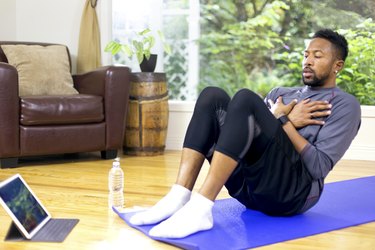
At some point or another, you've probably felt your shoulder pop or finger crack, right? And while these usually aren't cause for concern, hip popping during your workout (especially during ab exercises) can be particularly annoying and bothersome.
While hip pops during ab workouts aren't necessarily a red flag, it's best that you take time to figure out the cause of the sound to ensure your joints are safe and sound.
Video of the Day
Video of the Day
Read on to learn what your body is trying to tell you when your hips pop with ab workouts.
1. Your Hip Flexors Are Overcompensating
Your abs are the main muscle used in a exercises like sit-ups and crunches. But if your core starts to fatigue during a set, your hip flexors can step in and compensate for the weakness, Samuel Chan, PT, DPT, CSCS, a physical therapist at Bespoke Treatments in New York, tells LIVESTRONG.com.
That's especially true for ab exercises that naturally involve some hip-flexor activation, such as sit-ups. You may also feel your hip clicking when lifting your legs during ab exercises such as leg lifts and scissors.
Although form isn't usually a primary reason your hips pop when doing sit-ups and other ab exercises, Chan says, it's probably one of the easiest causes to address. All you need to do is make a few adjustments to create a tilt in the back of your hips.
Fix It
"Fix this by making sure to engage a posterior pelvic tilt, squeezing your abs and glutes before curling up," Chan says. "You should feel the abs lifting you during the sit up, not your hip flexors doing the work."
2. You May Have Snapping Hip Syndrome
If you feel a snapping sensation or your hips pop when doing leg lifts, it's also possible that you have an underlying condition called snapping hip syndrome, according to the American Academy of Orthopaedic Surgeons (AAOS).
"[Snapping hip] is where the hip flexor tendon glides over a bony [part of the hip], causing a pop," Chan says. "This may be due to tightness of the hip flexors, repetitive hip flexion movements during sports and activities or poor motor control."
Although it may sound scary, snapping hip syndrome is usually painless and harmless, per the AAOS. But in some cases, snapping hip can lead to swelling in the fluid-filled sacs in the joint, which can cause discomfort.
Fix It
Icing your hip and incorporating different types of exercise into your routine can help reduce the snapping. Hip flexor exercises can also help minimize the hip popping, he says.
While most people don't see a doctor for this condition, according to the AAOS, if you experience any pain, reach out to a physical therapist or sports medicine physician.
3. Your Tendons May Be Pinching
Your hips are ball-and-socket joints, which is why your legs are able to move in all directions. Due to the way this joint moves, though, the hip joint can pinch or catch on tissues at the front of the joint, according to Stanford Healthcare.
Also known as hip impingement, this condition may not present with any symptoms of at all. But in other cases, you may hear a locking or clicking sound on the inner hip, per Stanford Healthcare. If the hip popping comes with pain or swelling, it's best to stop exercising for the time being and consult a medical professional.
Fix It
If you're pain-free, you can practice some exercises to help fix the issue. Chan recommends incorporating posterior chain (back of the body) strengthening exercises into your workout routine to target the glutes and hamstrings. Squats, glute bridges and hamstring curls are just a few to try.
4. Your Cartilage May Be Torn
Also known as your labrum, the cartilage in your hip is responsible for cushioning the joint and keeping the ball at the top of your thigh securely in the socket, according to the Mayo Clinic. But if the labrum is torn, it can catch on the joint, causing a popping sensation.
Generally, labral tears happen after a trauma or injury to the hip joint. Athletes are at higher risk of a labral tear due to the repetitive motions involved in sports. So if you're doing a lot of the same exercises day after day, you may have a higher likelihood of injury.
Fix It
If you think your cartilage may be torn or are experiencing any kind of sharp pain or stiffness in your hip or groin, it's probably best that you consult a medical professional such as a sports medicine physician for imaging.
As with hip impingement, exercises that strengthen your posterior chain can help your body cope with labral tears, Chan says. However, since cartilage cannot reattach itself, your doctor may also recommend surgery to repair the tissue. Consult a doctor or physical therapist to find the best and safest treatment route for you.
Related Reading